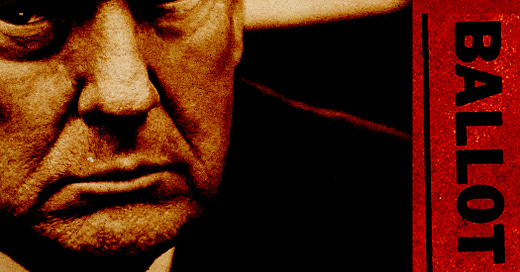The Lawsuit in Colorado That Could Block Trump from the Ballot
It’s a long shot, and many legal questions remain. But if the Fourteenth Amendment case goes against the former president, his re-election bid could stall at the starting line.
ON MONDAY, A FIVE-DAY EVIDENTIARY HEARING began in a Colorado state court on a civil lawsuit brought against the Colorado secretary of state and Donald J. Trump seeking to enforce Section 3 of the Fourteenth Amendment to the Constitution by banning Trump from the presidential ballot in 2024 in that state. Although the case feels like a footnote to the four high-profile criminal trials awaiting Trump, it is the only one that could have a direct impact on the 2024 election.
Bear in mind that the original U.S. Constitution sets forth only three criteria for the presidency: citizenship (“a natural born Citizen”), age (“thirty five Years”), and residency (“fourteen Years a Resident within the United States”). When the Twenty-second Amendment took effect in 1951, it added another criterion: no one could be elected president who had previously served two terms. The Constitution says nothing about felony status or even that presidents must not reside in prison when elected. If Trump is convicted in any of the four criminal cases—the two state cases (in New York and Georgia) and the two in federal court (in Florida and Washington, D.C.)—it would not render him constitutionally ineligible for the presidency. The only way he stays off the ballot is if the Republican party refuses to nominate him (a fantasy), or enough states refuse to put him on their respective ballots so as to make 270 Electoral College votes for him an impossibility.
Section 3 of the Fourteenth Amendment, which was ratified after the Civil War to deal with obstreperous former Confederates, ostensibly contains a fifth eligibility requirement: “No person shall . . . hold any office . . . under the United States . . . who, having previously taken an oath . . . as an officer of the United States . . . to support the Constitution of the United States, shall have engaged in insurrection or rebellion against the same.” Perhaps the most widely heard argument swirling in favor of Trump—both in expert commentary and by his lawyers in the Colorado case—is that invoking this provision would be anti-democratic and divisive. That may be true, but it’s not a legal argument—it’s a political one. The language exists in the Constitution in black and white. It has never been repealed and must be reckoned with.
The Colorado case is an attempt, through litigation, to start that process (other lawsuits are pending in Minnesota, Michigan, and elsewhere). The public watchdog group, Citizens for Responsibility and Ethics in Washington (CREW), filed the complaint on behalf of six Colorado voters under the state’s law governing primary elections, which gives the secretary of state the authority to “certify” the “names and party affiliations of the candidates to be placed on any presidential primary election ballots.” The law also provides that “it is the intent of the People of the State of Colorado” that the state’s election laws “conform to the requirements of federal law,” which of course includes Section 3. Threading these and a handful of other Colorado statutory provisions together, CREW claims that January 6th was an insurrection that Trump engaged in, and that “due to Trump’s constitutional ineligibility to serve as president, any action by the Secretary allowing Trump ballot access” would be a breach of that official’s duties under state law and the Fourteenth Amendment.
There are a bunch of factual and legal issues for the judge to decide here. The factual matters include (1) whether January 6th was an “insurrection” or “rebellion” and, if so, (2) did Trump “engage” in it? On Monday, CREW called to the witness stand a U.S. Capitol Police officer, a D.C. Metro Police officer, and Rep. Eric Swalwell (D-Cal.) to testify about what they experienced on the day the pro-Trump mob attacked the Capitol. The evidentiary hearing is expected to last through the week.
On the legal side, there are a number of machinations that Trump’s lawyers are making, undoubtedly with an eye to persuading five justices of the U.S. Supreme Court to take his side in an inevitable appeal (although they could refuse to hear the case on the grounds that it involves a political question that’s improper for courts to wade into). The most promising argument for Trump may be that the word “officer” in Section 3 only covers people within a president’s chain of command, not presidents themselves. The remaining legal questions hinge on state law, which vary across the country and which state legislatures are free to change.
Of course, basic math says that the challengers will need more than Colorado and Minnesota to bar Trump from winning the presidency again. But if they can get courts to rule that his actions around January 6th are disqualifying, and Special Counsel Jack Smith secures a conviction in the January 6th criminal case set for trial on March 4, 2024, there’s no telling how far and how fast the house of cards could fall.






